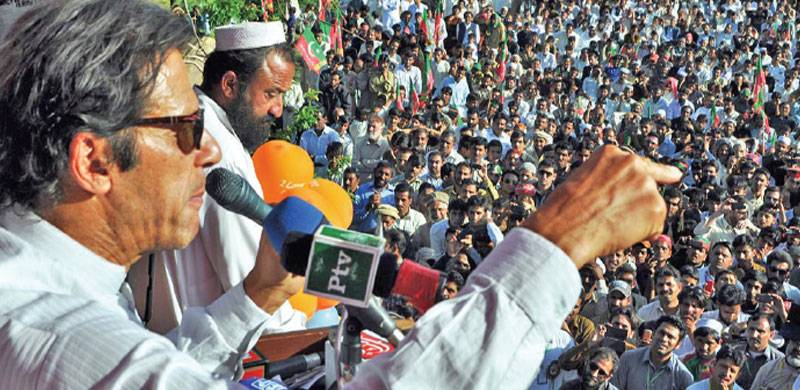
After being ousted from power on April 10, 2022, Imran Khan has resorted to blaming the national institutions -- Pakistan Army, Supreme Court of Pakistan and Election Commission of Pakistan -- for his fall from grace. At his Abbottabad jalsa on May 8, Khan lost all sense of political propriety, and referred to Mir Jafar and Mir Sadiq once again in his characteristic manner. It’s no coincidence that shortly after the rally, the Inter Services Public Relations (ISPR) took a strong exception to the intensified and deliberate attempts to drag the institution into the country's ongoing political discourse by “some political leaders, journalists and analysts”.
While addressing the rally in Jhelum on May 10, Imran Khan clarified that when he speaks of Mir Jafar in his speeches, he refers to Prime Minister Shehbaz Sharif, and no institution is the focus of this analogy.
Imran Khan needs to desperately brush up his knowledge of history.
In the mid-18th century, Nawab Siraj-ud-Daula, the sovereign ruler of Bengal, was facing the army of British East India Company commanded by Robert Clive. Clive had only 3,000 soldiers under his command while Siraj-ud-Daula commanded over 50,000 men, thousands of cannons and hundreds of war elephants. Yet, the Nawab suffered a crushing defeat by the British army at the Battle of Plessey in 1757 -- because of poor training, bad leadership and hopeless planning. Mir Jafar, the Nawab’s trusted companion, conspired against him. Clive bribed him.
Around the same time in history, in the Battle of Srirangapatna of 1799, British bribed Mir Sadiq, a trusted minister of Tipu Sultan of Mysore. Tipu Sultan, the Lion of Mysore, was killed in the battle.
The metaphors used by Imran Khan are irrelevant and out of context. Pakistan is an independent, sovereign, democratic country. Nawabs or sultans do not rule the country. It is not under an attack by any foreign power. Unlike Mir Jafar and Mir Sadiq, the two Sharif brothers have never been Khan’s trusted ministers, thus accusing them of betrayal is absolutely inappropriate.
During the mid-18th century, the Mughal Empire in India was on the verge of collapse. India was not one nation. Various nawabs and sultans were monarchs. There was no semblance of democracy. But today’s Pakistan is a democracy and the present coalition government has come to power through a constitutional process.
Accusing state institutions of betrayal is nothing short of treason. Instead of blaming others for the country’s misfortunes, it’s time we recognize and correct our mistakes. Let history decide the future of Pakistan. History never forgets or forgives traitors.
While addressing the rally in Jhelum on May 10, Imran Khan clarified that when he speaks of Mir Jafar in his speeches, he refers to Prime Minister Shehbaz Sharif, and no institution is the focus of this analogy.
Imran Khan needs to desperately brush up his knowledge of history.
In the mid-18th century, Nawab Siraj-ud-Daula, the sovereign ruler of Bengal, was facing the army of British East India Company commanded by Robert Clive. Clive had only 3,000 soldiers under his command while Siraj-ud-Daula commanded over 50,000 men, thousands of cannons and hundreds of war elephants. Yet, the Nawab suffered a crushing defeat by the British army at the Battle of Plessey in 1757 -- because of poor training, bad leadership and hopeless planning. Mir Jafar, the Nawab’s trusted companion, conspired against him. Clive bribed him.
The metaphors used by Imran Khan are irrelevant and out of context. Pakistan is an independent, sovereign, democratic country. Nawabs or sultans do not rule the country. It is not under an attack by any foreign power. Unlike Mir Jafar and Mir Sadiq, the two Sharif brothers have never been Khan’s trusted ministers, thus accusing them of betrayal is absolutely inappropriate.
Around the same time in history, in the Battle of Srirangapatna of 1799, British bribed Mir Sadiq, a trusted minister of Tipu Sultan of Mysore. Tipu Sultan, the Lion of Mysore, was killed in the battle.
The metaphors used by Imran Khan are irrelevant and out of context. Pakistan is an independent, sovereign, democratic country. Nawabs or sultans do not rule the country. It is not under an attack by any foreign power. Unlike Mir Jafar and Mir Sadiq, the two Sharif brothers have never been Khan’s trusted ministers, thus accusing them of betrayal is absolutely inappropriate.
During the mid-18th century, the Mughal Empire in India was on the verge of collapse. India was not one nation. Various nawabs and sultans were monarchs. There was no semblance of democracy. But today’s Pakistan is a democracy and the present coalition government has come to power through a constitutional process.
Accusing state institutions of betrayal is nothing short of treason. Instead of blaming others for the country’s misfortunes, it’s time we recognize and correct our mistakes. Let history decide the future of Pakistan. History never forgets or forgives traitors.

